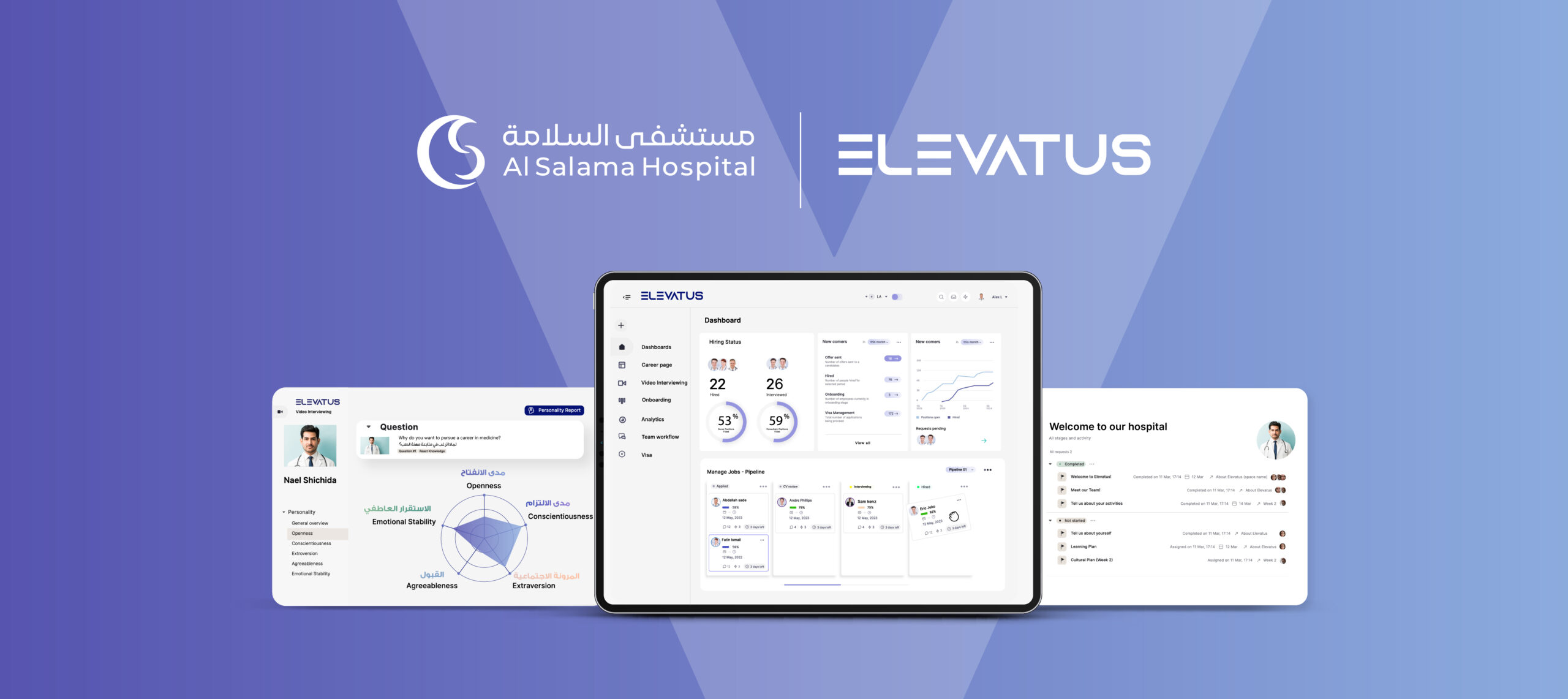
Video Assessment Interview
From Traditional to Trending: Types of Interviews Each Recruiter Should Know Today
November 3, 2023
Reem Al-Tamimi
Content Writer
Remember the days when a job interview was a quick chat and a firm handshake? Well, those days are long gone! In today’s job market, job interviews have become a multifaceted experience that both recruiters and candidates need to navigate with precision.
According to Glassdoor, the average job interview process now lasts almost a whopping 24 days. It’s like a marathon, and most jobs require multiple rounds of interviews, each with its own unique twist. If you’ve only had the classic Q&A sessions, it’s time to buckle up because the interview world has gotten a lot more interesting.
Today, job interviews come in all shapes and sizes, and you don’t want to be caught off guard. That’s why we are here. This guide will make sure you’re well-prepared to tackle whatever kind of interview comes your way. We’re going to break down the common types of interviews, as well as some quirky ones you might not have heard of.
So, let’s dive right in, one interview type at a time!
Test & evaluate key skills in seconds
Scaling up? Assessing remotely? Evaluate top performers with fair and secure video assessment interviews that take your screening to the next level.
Request a demoTable of Contents
The Evolution of the Types of Job Interview Techniques
The story of job interviews goes way back to a time when employers realized that a résumé didn’t tell the whole story. That’s when the interview scene came into play – job candidates meeting hiring managers, trying to prove they’re the perfect fit for the role.
But things have evolved. Nowadays, a single interview often isn’t enough. Recruiters want a more comprehensive view, evaluating not just skills but also personality and how well a candidate fits into the team. That’s where different job interview types come in handy.
Research shows that relying solely on a chat isn’t the best way to judge a candidate. To get the full picture, recruiters use a mix of interviews, exercises, and tests that truly reveal what a candidate brings to the table.
The type of interview used may vary based on the job, but the goal remains the same – to see if a candidate can handle the job’s responsibilities and make a positive impact on the company. It’s all about making a seamless match between the candidate and the role. Understanding these various interview types is a recruiter’s key to making the right hires.
Looking Back to Traditional Types of Job Interview Methods
In the realm of hiring, traditional types of interview methods have long held their ground. These time-tested techniques have been the cornerstone of candidate evaluation for decades. In this exploration, we delve into the tried-and-true practices that have shaped recruitment processes and continue to play a significant role in today’s job market.


In-person Interviews
In-person interviews involve face-to-face interactions between candidates and interviewers, typically conducted at the company’s office. In this section, we explore what in-person interviews entail, their advantages and disadvantages for recruiters, and provide insights into conducting these interviews effectively.
What They Are:
In-person interviews are traditional and widely recognized as the standard method of assessing candidates. Candidates are invited to the company’s physical location, where they meet with interviewers for a structured conversation. These interviews provide a firsthand opportunity to evaluate a candidate’s demeanor, body language, and interpersonal skills.
Pros:
- Non-verbal Cues: In-person interviews allow recruiters to assess non-verbal cues, such as body language and eye contact, which can be essential in understanding a candidate’s communication skills and confidence.
- Personal Interaction: They facilitate direct, real-time interaction, creating opportunities to build rapport and assess a candidate’s cultural fit.
- Comprehensive Assessment: In-person types of interviews can encompass a variety of interview techniques, including structured, unstructured, or behavioral interviews, providing a comprehensive evaluation.
Cons:
- Logistical Challenges: Coordinating in-person interviews may involve logistical challenges related to scheduling, travel, and meeting room availability.
- Costs: In-person interviews often incur costs associated with travel arrangements and on-site facilities.
- Limited Geographical Reach: In-person interviews limit the pool of candidates to those who can attend in person, potentially excluding remote or international applicants.
Structured Interviews
Structured types of interviews follow a systematic and predefined format, with a set of standardized questions for all candidates. In this section, we explore what structured interviews entail, their advantages and disadvantages for recruiters, and provide insights into conducting these interviews effectively.
What They Are:
Structured interviews are characterized by their organized and consistent approach to candidate assessment. Recruiters use a predetermined set of questions, often focusing on specific competencies or job-related skills. These interviews aim to ensure fairness and objectivity by asking all candidates the same questions in the same order.
Pros:
- Consistency: Structured interviews promote consistency in candidate assessment, as every candidate responds to the same questions.
- Objective Evaluation: They provide an objective basis for evaluating candidates, as assessments are based on standardized criteria.
- Efficiency: Structured interviews are efficient and can be conducted quickly, making them suitable for high-volume recruitment.
Cons:
- Rigidity: The structured format may feel rigid and may not allow for exploring candidates’ unique qualities or situations.
- Limited Flexibility: Structured interviews may not adapt well to positions that require unconventional skills or involve dynamic responsibilities.
- Potential for Bias: Despite standardized questions, bias can still influence evaluations if not addressed.


Unstructured Interviews
Unstructured types of interviews are informal, open-ended conversations that allow candidates to express themselves naturally. In this section, we explore what unstructured interviews entail, their advantages and disadvantages for recruiters, and provide insights into conducting these interviews effectively.
What They Are:
Unstructured interviews are characterized by their relaxed and conversational nature. Unlike structured interviews that follow a predefined set of questions, unstructured interviews allow for spontaneous discussions on a wide range of topics. Recruiters aim to create a comfortable environment where candidates can share their experiences, thoughts, and personality without rigid constraints.
Pros:
- Candidate Comfort: Unstructured interviews tend to put candidates at ease, allowing them to showcase their true selves more effectively.
- Revealing Personality: Recruiters can gain deeper insights into a candidate’s personality, communication style, and thought processes.
- Flexibility: Unstructured interviews provide flexibility to explore relevant topics organically as the conversation unfolds.
Cons:
- Subjectivity: The lack of structure can lead to subjective assessments, making it challenging to compare candidates objectively.
- Inconsistency: Interviewers may inadvertently focus on different aspects of a candidate’s background or experience, leading to inconsistency in evaluations.
- Risk of Overlooking Skills: Unstructured interviews may not sufficiently assess specific technical or job-related skills.
Assess thousands of applicants in a few clicks
Assess the skill sets and potential of applicants with automated video assessment interviews that are fair and secure.
Start assessing top talentPanel Interviews
Panel types of interviews involve multiple interviewers assessing a candidate simultaneously. In this section, we explore what panel interviews entail, their advantages and disadvantages for recruiters, and provide insights into conducting these interviews effectively.
What They Are:
Panel interviews, also known as group interviews, consist of a group of interviewers, often comprising members from different departments or teams within the organization. These interviewers collectively evaluate a candidate’s qualifications, skills, and suitability for the job role. The candidate responds to questions and interacts with the panel, allowing for diverse perspectives during the assessment.
Pros:
- Diverse Perspectives: Panel interviews offer diverse viewpoints, with multiple interviewers bringing varied expertise and perspectives to the assessment process.
- Reduced Bias: They can reduce individual bias and ensure a more objective evaluation of candidates.
- Efficiency: Panel interviews allow for comprehensive assessment in a single session, making them efficient for evaluating candidates.
Cons:
- Coordination: Coordinating schedules and aligning multiple interviewers can be challenging and may lead to scheduling conflicts.
- Candidate Intimidation: Some candidates may find panel interviews intimidating, which can affect their performance.
- Consensus Building: It may take longer to reach a consensus on the candidate’s suitability due to differing opinions among panel members.
Behavioral Interviews
Behavioral types of interviews focus on a candidate’s past behavior and actions as indicators of future performance. In this section, we explore what behavioral interviews entail, their advantages and disadvantages for recruiters, and provide insights into conducting these interviews effectively.
What They Are:
Behavioral interviews are designed to uncover how candidates have responded to specific situations or challenges in their past professional experiences. Recruiters use open-ended questions that encourage candidates to share detailed accounts of their actions, behaviors, and outcomes in real-world scenarios. The underlying assumption is that past behavior is a reliable predictor of future performance.
Pros:
- Predictive Value: Behavioral interviews are considered highly predictive of a candidate’s future performance as they rely on concrete examples from the candidate’s history.
- Structured Approach: They provide a structured framework for assessing candidates, with predetermined questions that ensure consistency.
- Relevant Insights: Behavioral interviews offer valuable insights into a candidate’s problem-solving skills, interpersonal abilities, and adaptability.
Cons:
- Time-Intensive: Preparing and conducting behavioral interviews can be time-intensive, as they often require in-depth analysis of candidate responses.
- Subjectivity: Evaluating responses can be subjective, and different recruiters may interpret a candidate’s past behavior differently.
- Limited to Past Experience: Behavioral interviews may not assess a candidate’s potential to adapt to new situations or respond to hypothetical scenarios.


Exploring Trending Types of Interviews
Trending interview techniques are the pioneers of the hiring landscape, bringing innovation and excitement to the recruitment process. They’re not just different; they’re designed to tackle precise challenges and deliver invaluable insights, all while supercharging recruiters with newfound efficiency. These techniques are ready to reshape how we find the perfect fit for our teams.
Virtual Interviews
Virtual types of interviews have gained significant prominence, especially in the era of remote work and global connectivity. Here, we delve into what virtual interviews entail, their advantages and disadvantages for recruiters, and provide examples of tools and platforms that facilitate these interviews.
What They Are:
Virtual interviews are conducted through video conferencing platforms or other online communication tools. They allow recruiters and candidates to interact and conduct interviews without being physically present in the same location. These interviews aim to bridge geographical gaps and provide a flexible means of assessing candidates remotely.
Pros:
- Geographical Flexibility: Virtual interviews enable recruiters to connect with candidates from anywhere in the world, expanding the talent pool.
- Time and Cost Efficiency: They reduce the need for candidates to travel, saving both time and expenses.
- Scheduling Convenience: Virtual interviews offer flexibility in scheduling, making it easier to coordinate interviews across different time zones.
Cons:
- Technical Challenges: Technical issues, such as poor internet connections or platform glitches, can disrupt the flow of virtual interviews.
- Limited Non-verbal Cues: Assessing non-verbal cues, body language, and the candidate’s environment can be more challenging in a virtual setting.
- Engagement: Maintaining candidate engagement and rapport-building may require additional effort in a virtual environment.
Group Interviews
Project-based types of interviews are a hands-on approach to candidate assessment, allowing them to demonstrate their skills and abilities by completing a task relevant to the job role. Here, we explore what project-based interviews entail, their advantages and disadvantages for recruiters, and provide examples of tools that can facilitate these interviews.
What They Are:
Project-based interviews require candidates to work on a specific project or task that mirrors the responsibilities of the job they are applying for. These projects can vary widely, from coding challenges for software developers to creating marketing campaigns for marketers. The goal is to provide candidates with a real-world scenario that showcases their abilities and problem-solving skills.
Pros:
- Practical Assessment: Project-based interviews offer a practical evaluation of a candidate’s skills, providing concrete evidence of their capabilities.
- Relevance: The tasks assigned in these interviews are directly related to the job, ensuring that candidates can perform the required duties.
- Creativity and Problem-solving: Candidates have the opportunity to showcase their creativity and problem-solving abilities in a realistic context.
Cons:
- Resource Intensive: Designing, assigning, and evaluating projects can be resource-intensive for recruiters.
- Time-consuming: Project-based interviews can extend the recruitment timeline, which may not be suitable for roles that require immediate hiring.
- Subjectivity: Evaluating project outcomes can be subjective, and different recruiters may interpret results differently.
Project-based Interviews
Project-based types of interviews require candidates to complete a specific task or project related to the job role. This technique offers a practical assessment of a candidate’s skills and capabilities. Tools like Trello, GitHub, or even Google Docs can be used to assign and evaluate these tasks.
However, it can be time-consuming to design and evaluate projects. Recruiters use project-based interviews to gauge a candidate’s ability to perform job-related tasks.


Cultural Fit Interviews
Cultural fit types of interviews focus on aligning candidates with the values, beliefs, and work culture of an organization. In this section, we’ll delve deeper into what cultural fit interviews entail, their advantages and disadvantages for recruiters, and provide examples of tools that can aid in conducting these interviews.
What They Are:
Cultural fit interviews are designed to assess whether a candidate’s values, work style, and personality align with the existing company culture. These interviews go beyond evaluating technical skills and qualifications to ensure that candidates will thrive within the organization’s environment. Recruiters use questions and discussions to gauge a candidate’s compatibility with the company’s ethos, teamwork, and overall work culture.
Pros:
- Team Cohesion: Cultural fit interviews help build cohesive and harmonious teams by ensuring that new hires share the organization’s values and beliefs.
- Retention: Candidates who fit well with the company culture are more likely to stay longer and perform better, reducing turnover.
- Conflict Mitigation: Assessing cultural fit in advance can help prevent potential conflicts and disruptions within teams.
Cons:
- Potential Bias: Cultural fit interviews can unintentionally perpetuate bias if the organization’s culture is not inclusive or diverse.
- Subjectivity: Determining cultural fit can be subjective and may vary from one interviewer to another.
- Overlooking Diversity: Relying solely on cultural fit can lead to overlooking diverse perspectives and talents that may contribute positively to the organization.
AI-powered & Automated Interviews
AI-powered and automated types of interviews represent a significant shift in the realm of candidate assessments. These interview types harness the capabilities of artificial intelligence (AI) and automation to streamline the recruitment process. Here, we dive deeper into what these interviews entail, their pros and cons for recruiters, and examples of tools commonly used in this category.
What They Are:
AI-powered and automated types of interviews utilize advanced technology to assess and evaluate candidates. Instead of traditional face-to-face or even virtual interactions, candidates are often presented with a set of pre-recorded questions or prompts. Their responses, recorded via video or text, are then analyzed and scored by AI algorithms. These interviews aim to efficiently screen and shortlist candidates based on specific criteria, allowing recruiters to focus their attention on the most promising prospects.
Pros:
- Efficiency: One of the primary benefits is efficiency. AI can quickly process and evaluate large numbers of candidate responses, significantly reducing the time spent on initial screenings.
- Standardization: Automated interviews ensure that every candidate receives the same set of questions, promoting fairness and consistency in the assessment process.
- Objective Scoring: AI algorithms can objectively score candidate responses based on predefined criteria, reducing human bias and subjectivity.
Cons:
- Lack of Personal Interaction: Automated interviews lack the personal touch of traditional interviews. They don’t allow for real-time interaction or the assessment of soft skills like communication and rapport-building.
- Potential for Bias: While AI aims to reduce bias, it can inadvertently perpetuate existing biases if the algorithms are trained on biased data.
- Limited Depth: These interviews may not delve deeply into a candidate’s abilities, as they often focus on specific, predefined questions.
Blended Interviews (Traditional + Trending)
Blended types of interviews represent a fusion of both traditional and trending interview techniques. These interview types aim to leverage the strengths of both approaches to provide a more comprehensive evaluation of candidates. Below, we explore what blended interviews entail, their advantages and disadvantages for recruiters, and some examples of tools used in this category.
What They Are:
Blended interviews combine elements of traditional interviews, such as in-person or panel discussions, with trending techniques, such as project-based tasks or virtual components. The goal is to create a holistic assessment process that incorporates personal interaction while also integrating innovative evaluation methods. By blending different interview types, recruiters seek to gain a well-rounded perspective of a candidate’s skills, suitability, and cultural fit.
Pros:
- Comprehensive Assessment: Blended interviews provide a more holistic view of candidates by combining the strengths of various interview types. They can evaluate both technical skills and soft skills effectively.
- Personal Interaction: Traditional interview elements enable recruiters to gauge a candidate’s interpersonal skills, communication, and cultural alignment with the organization.
- Innovation and Efficiency: Incorporating trending techniques can introduce efficiency and innovation into the recruitment process, allowing recruiters to assess candidates in creative ways.
Cons:
- Complexity: Blended interviews can be more complex to design, coordinate, and evaluate compared to single-format interviews.
- Resource Intensive: Integrating multiple interview types may require more time, effort, and resources from recruiters and candidates alike.
- Bias Risk: Care must be taken to ensure that the blend of interview types does not inadvertently introduce bias or inconsistency into the assessment process.


Asynchronous Video Interviews
Asynchronous video types of interviews are a modern approach to candidate assessment, allowing candidates to record responses to predefined questions at their convenience. In this section, we explore what asynchronous video interviews entail, their advantages and disadvantages for recruiters, and provide insights into conducting these interviews effectively.
What They Are:
Asynchronous video interviews are conducted using specialized platforms that present candidates with a set of pre-recorded questions. Candidates record their responses using video, typically within a specified time frame, without the need for real-time interaction with interviewers. Recruiters then review and evaluate the recorded responses at their convenience.
Pros:
- Flexibility: Asynchronous video interviews offer flexibility for both candidates and recruiters, allowing them to participate at their preferred times.
- Time-Efficiency: They reduce the need for scheduling and coordination, saving time for recruiters and candidates.
- Consistency: All candidates respond to the same set of questions, ensuring a consistent evaluation process.
Cons:
- Limited Interaction: Asynchronous video interviews lack real-time interaction, making it challenging to assess interpersonal skills and immediate responses.
- Potential for Scripted Responses: Candidates may have the opportunity to rehearse and script their responses, potentially leading to less authentic answers.
- Technology Reliability: Technical issues, such as video recording problems or poor internet connections, can disrupt the interview process.
Immersive VR (Virtual Reality) Interviews
Immersive VR types of interviews represent the cutting edge of candidate assessment, utilizing virtual reality technology to create immersive and interactive interview experiences. In this section, we explore what immersive VR interviews entail, their advantages and disadvantages for recruiters, and provide insights into conducting these interviews effectively.
What They Are:
Immersive VR interviews leverage virtual reality headsets and environments to simulate real-world interview scenarios. Candidates put on VR headsets and are immersed in a digital environment where they interact with interviewers, respond to questions, and complete tasks. These interviews aim to provide a realistic and immersive assessment experience.
Pros:
- Realistic Simulations: Immersive VR interviews offer realistic simulations of job-related scenarios, providing valuable insights into a candidate’s abilities and responses.
- Assessment of Soft Skills: They enable the assessment of soft skills such as problem-solving, teamwork, and adaptability in interactive scenarios.
- Global Reach: VR interviews can be conducted remotely, allowing recruiters to reach candidates from around the world without the need for physical presence.
Cons:
- Technical Complexity: Implementing VR interviews requires technical expertise and equipment, which can be costly and challenging to set up.
- Limited Availability: VR headsets and technology may not be accessible to all candidates, potentially limiting the candidate pool.
- Training Requirements: Recruiters and interviewers need training to effectively conduct and evaluate VR interviews.
Tools and Platforms for Every Recruiter’s Arsenal
Thanks to an array of powerful tools and platforms, job interviews in the digital era have undergone a significant transformation. These modern solutions have revolutionized the way recruiters and candidates engage in interviews, making the process more efficient and effective. Here, we explore how these digital innovations are reshaping the landscape of job interviews.
- Video Conferencing Tools: Platforms like Zoom, Skype, and Google Meet have erased geographical boundaries, allowing recruiters to conduct face-to-face types of interviews virtually. This enables real-time assessment of candidates’ communication skills and professionalism.
- Online Assessment Platforms: Tools like EVA-SSESS simplify technical evaluations. Recruiters can now gauge candidates’ problem-solving abilities and coding skills through digital assessments. It also offers scientifically validated AI personality reports that give you insights into the candidates’ core personality traits.
- Virtual Reality (VR) Environments: Immersive VR interviews set a new standard. Oculus Rift and HTC Vive offer lifelike simulations to assess practical skills, teamwork, and adaptability.
- Asynchronous Video Interviews: A platform such as EVA-SSESS offers flexibility through one-way video interviews. Candidates record responses to predefined questions, and recruiters review these video submissions at their convenience.
- Collaboration and Communication Tools: Slack, Trello, and Asana streamline coordination among interviewers and hiring teams, ensuring a seamless process.
- Document and File Sharing Platforms: Google Docs, Dropbox, and OneDrive facilitate easy sharing of resumes, portfolios, and references, simplifying recruiters’ review of application materials.
Embracing these digital resources enhances the interview experience, making it smoother, more efficient, and more comprehensive for both recruiters and candidates. In this dynamic era, these tools have reshaped the way we approach job interviews.


Experience The Power of Diverse Types of Job Interviews
Dear recruiters, here’s the deal:
Knowing the ins and outs of various types of interviews is your secret sauce for success. In today’s job market, one-size-fits-all recruitment doesn’t cut it anymore. This is because different roles need different assessment approaches. From classic in-person chats to mind-blowing VR interviews, each method brings something unique to the table.
But it’s not just about being cool and trendy. It’s about finding that perfect match for your company and the role you’re hiring for. And let’s face it, staying updated is non-negotiable. AI-powered types of interviews are evolving the recruitment world, and you don’t want to be left behind. So, embrace the variety, adapt, and keep those recruitment techniques fresh. Your next superstar hire might just be waiting for that unique interview experience!
Are you in search of a cutting-edge tool for conducting AI-powered types of interviews?
EVA-SSESS is a next-generation video interviewing software that helps companies identify, hire, and develop top talent fast. EVA-SSESS offers richer insights into the assessment process through AI technology, reliable video-based assessments, and scientifically validated psychometric reports. Enterprises rely on EVA-SSESS to build customizable assessments, detect ideal keywords, rank applicants, filter out correct answers, and effortlessly assess the skills that are tough to measure. Request a free demo today!
Turn top talent to employees fast
Hire, assess, onboard and manage top talent for every job. See how Elevatus streamlines everything; from acquire to new hire.
Request a demoAuthor
Reem Al-Tamimi
Don't miss a thing!
Stay one step ahead. Subscribe and get the latest updates, news, and insights from Elevatus straight to your inbox.


![10 Best Video Interview Software for Faster Hiring [Free + Paid] | Elevatus An image of a woman giving an interview using best video interview software](https://www.elevatus.io/wp-content/uploads/2023/08/1-24.png)



